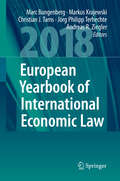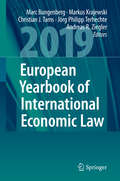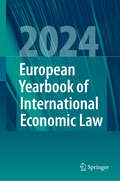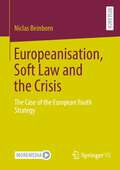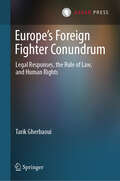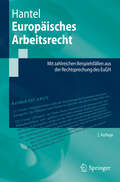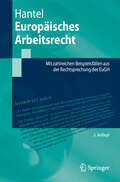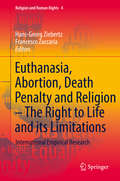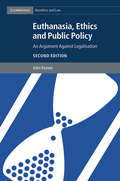- Table View
- List View
European Yearbook of International Economic Law 2018 (European Yearbook of International Economic Law #9)
by Markus Krajewski Jörg Philipp Terhechte Marc Bungenberg Andreas R. Ziegler Christian J. TamsVolume 9 of the EYIEL focusses on natural resources law understood as a special area of international economic law. In light of increasing conflicts over access to and the use of natural resources and of their impact on political, social and environmental aspects, the contributions of this volume analyse to which extent international economic law can contribute to the sustainable exploitation, management and distribution of natural resources. The volume collects contributions on general principles of natural resources law, the importance of natural resources for trade, investment and European economic law as well as analyses of particular sectors and areas including fracking, timber, space and deep seabed mining and natural resources in the arctic region.In its section on regional developments, EYIEL 9 addresses two regional integration systems which are usually not at the centre of public interest, but which deserve all the more attention due to their special relations with Europe: The Eurasian Economic Union and the Caribbean Community (CARICOM). Further EYIEL sections address recent WTO and investment case law as well as developments at the IMF. The volume also contains review essays of important recent books in international economic law and other aspects of international law which are connected to international economic relations.The chapter "Sovereignty, Ownership and Consent in Natural Resource Contracts: From Concepts to Practice" by Lorenzo Cotula is open access under a CC BY 4.0 license via link.springer.com.
European Yearbook of International Economic Law 2019 (European Yearbook of International Economic Law #10)
by Markus Krajewski Jörg Philipp Terhechte Marc Bungenberg Andreas R. Ziegler Christian J. TamsVolume 10 of the EYIEL focusses on the relationship between transnational labour law and international economic law on the occasion of the 100th anniversary of the International Labour Organisation (ILO). As one of the oldest UN Agencies, the ILO has achieved considerable progress with respect to labour rights and conditions. The contributions to EYIEL Volume 10 assess these achievements in light of current and future challenges. The ILO’s core instruments and legal documents are analysed and similarly the impact labour standards have on trade and investment agreements. In its regional section, EYIEL 10 addresses recent developments in the US and the EU, including the US’ trade policy strategy towards China as well as the reform of the NAFTA. In its part on institutions, EYIEL 10 focusses inter alia on the role of the rule of law in relation to current practices of the International Monetary Fund and of the WTO’s Appellate Body as an international court. Furthermore, it provides an overview of current cases before the WTO. Finally, the volume entails a section with review essays on recently published books in the field of international economic law and international investment law.
European Yearbook of International Economic Law 2020 (European Yearbook of International Economic Law #11)
by Markus Krajewski Jörg Philipp Terhechte Marc Bungenberg Andreas R. Ziegler Christian J. TamsVolume 11 of the EYIEL focuses on rights and obligations of business entities under international economic law. It deals with the responsibilities of business entities as well as their special status in various subfields of international law, including human rights, corruption, competition law, international investment law, civil liability and international security law. The contributions to this volume thus highlight the significance of international law for the regulation of business entities. In addition, EYIEL 11 addresses recent challenges, developments as well as events in European and international economic law such as the 2019 elections to the European Parliament, Brexit and the EU-Mercosur Free Trade Agreement. A series of essays reviewing new books on international trade and investment law completes the volume.
European Yearbook of International Economic Law 2021 (European Yearbook of International Economic Law #12)
by Markus Krajewski Jörg Philipp Terhechte Marc Bungenberg Andreas R. Ziegler Christina Binder Jelena Bäumler Christian J. Tams Giesela RühlVolume 12 of the EYIEL focuses on “The Future of Dispute Settlement in International Economic Law”. While new forms of dispute settlement are emerging, others are in deep crisis. The volume starts off with reflections on Dispute Settlement and the World Trade Organisation, most prominently the crisis of the Appellate Body, but also addressing international intellectual property law and the African Continental Free Trade Area. This is followed by a section on Dispute Settlement and Investment Protection/International Investment Law, which includes articles on the summary dismissal of claims, the margin of appreciation doctrine, the use of conciliation to settle sovereign debt disputes, and contract-based arbitration in light of Achmea and Hagia Sophia at ICSID. Further contributions consider the emerging role of commercial courts, the dejudicialization of international economic law, dispute settlement in the UK-EU Withdrawal Agreement, reference mechanisms in dispute resolution clauses, and UNCLOS.
European Yearbook of International Economic Law 2022 (European Yearbook of International Economic Law #13)
by Markus Krajewski Jörg Philipp Terhechte Marc Bungenberg Andreas R. Ziegler Christina Binder Jelena Bäumler Christian J. Tams Giesela RühlClimate change is the defining challenge of our time. While political leadership and scientific expertise are key, law has a major role to play in fashioning responses. Volume 13 of the EYIEL assesses central aspects of the legal regimes governing "Climate Change and Liability". Covering traditional trade and investment topics as well EU instruments regulating private actors, contributions reflect the diverse links between international economic law and climate change. Through a mix of foundational inquiries and coverage of current issues (such as climate change litigation), the volume offers a rich and nuanced account of international economic law in an era of "Climate Change and Liability".
European Yearbook of International Economic Law 2023 (European Yearbook of International Economic Law #14)
by Markus Krajewski Jörg Philipp Terhechte Marc Bungenberg Andreas R. Ziegler Christina Binder Jelena Bäumler Christian J. Tams Giesela RühlThe focus of volume 14 of the EYIEL is on “(Public) Procurement and Competition Law in European and International Economic Law”. It is testimony to the fact that areas of law originally perceived as purely economic are permeated by the challenges of society today and adapting to these by embracing innovation, promoting sustainability and social responsibility and including new values in their legal constitutions. Thus, the focus section provides a broad spectrum of contributions considering the interaction between (public) procurement law and WTO law, the role of RTAs, the inclusion of sustainability aspects as well as the influence recent development and challenges such as the Covid-19 pandemic and climate change have on public procurement and competition policy. In its general section the EYIEL considers “Current Challenges, Developments and Events in European and International Economic Law”. It provides a cross-section of recent developments touching upon the Next Generation EU, food commodification, new regulatory approaches to geographical indications, the interaction between investment law and human rights as well as the newest developments with regard to Public-Private Partnership Legislation.
European Yearbook of International Economic Law 2024 (European Yearbook of International Economic Law #15)
by Markus Krajewski Jörg Philipp Terhechte Marc Bungenberg Andreas R. Ziegler Christina Binder Jelena Bäumler Christian J. Tams Giesela RühlAs global economic governance faces mounting challenges—from climate change to geopolitical shifts—the 2024 edition of EYIEL revisits the enduring debate of fragmentation vs. integration in international economic law. Exploring trade, investment, sustainability, and human rights, this volume examines the evolving interplay between economic regulation and pressing global concerns. With insights from leading scholars, it asks: Are we moving towards greater legal cohesion or deeper disintegration?
European and International Media Law
by Jan OsterThis book is the first to incorporate current academic literature and case law on European, transnational, and international media law into a comprehensive overview intended primarily for students. It introduces the legal framework for globalised communication via mass media, and considers the transformative effect globalisation has had on domestic media law. Engaging case examples at the beginning of each chapter, and questions at the end, give students a clearer idea of legal problems and encourage them to think critically. A wide variety of topics - including media economics, media technology, and social norms concerning media publications - are discussed in relation to media law, and numerous references to case law and suggestions for further reading allow students to conduct independent research easily.
Europeanisation of Private Enforcement of Competition Law: The Case of Albania
by Gentjan SkaraThis book argues that the European integration process (Europeanisation) is pushing the member states and candidate countries toward a greater convergence with the EU’s competition acquis. Through the transposition of the Directive 2014/104/EU, the member states have harmonised substantive and procedural rules, which is beneficial to individuals and enterprises because it provides a minimum protection across all member states. In addition, it is commonly agreed in academia that the prospect of EU membership brings positive domestic changes in the candidate countries. At the moment, Albania is waiting to open negotiations for the chapters of the EU acquis.Firstly, this book addresses the evolution of private enforcement at the European level by examining the objectives, modalities, and actors that contributed to the development of private enforcement. Secondly, it analyses the Directive 2014/104/EU and how the three selected EU member states have transposed the directive into their domestic legal system considering the discretion margin left by Article 288 TFEU and a minimum harmonisation level defined in the directive. Thirdly, it provides a historical overview of private enforcement in Albania and shows how the Albanian Competition Authority has addressed the transposition of the Directive 2014/104/EU.
Europeanisation, Soft Law and the Crisis: The Case of the European Youth Strategy
by Niclas BeinbornInfluence of “hard” law on national policies still is a central topic in Europeanisation research. One aspect often overlooked is the impact of “soft” law instruments such as the “Open Method of Coordination” (OMC). Through the OMC all member states agree on common goals and exchange “best practices” to improve policy coordination in a certain area without the obligation (how) to design policies. OMC impacts in individual member states have been studied extensively, yet a comparative perspective explaining their variance is lacking. This study by Niclas Beinborn tries to fill this gap by analysing the different impacts of a recent OMC: the European Youth Strategy 2010 (EUYS). His analysis is twofold: in a first step he applies theory-driven fuzzy-set QCA to a novel dataset depicting the variance of national activities around the EUYS. As causalities remain unclear, in a second step he presents an innovative analysis framework encompassing two dimensions – national motivation and relative openness to implement non-binding EU law – to define ideal types of OMC adaptation. Case studies on the EUYS in Germany and Ireland proof the potential of this framework to explain why and how OMCs work (differently).
Europeanization of Environmental Policies and their Limitations: Capacity Building
by Arpad Todor Florenţa Elena HelepciucThis book offers a window into the mechanisms that drive events when countries with poor track records in environmental protection and low administrative capacity, join an organisation with ambitious environmental regulatory regimes, which include some of the highest environmental protections standards in the world.This book examines the institutional building capacity in Romania after two decades of the development of the EU's environmental policy on elaboration, transposition, implementation, monitoring and institutional building. The book examines how Romania has fared as one of the least environmentally friendly EU member states, and poses the following questions. What are the limits of Europeanisation in the area of public policies? What is the reason why, despite the overwhelming public interest in environmental issues, and widespread agreement that urgent action to protect the environment and prevent catastrophic climate change are paramount, the pace of achieving the goals is remains slow. Why do policies fail?This book brings together several case studies focusing on the evolution of environmental policies in Romania over the last twenty years, with a special focus on the post-accession period (2007 onwards). The book provides an analysis of policies, where progress is less than satisfactory, and examines why this is the case.
Europe’s Foreign Fighter Conundrum: Legal Responses, the Rule of Law, and Human Rights
by Tarik GherbaouiThis book explores how Europe can resolve its foreign fighter conundrum without losing its credibility as a guardian of the rule of law and human rights. Centring on European foreign fighters who travelled to the armed conflict in Syria and Iraq, this book examines to which extent legal responses to the security threat posed by foreign fighters have been consistent with the rule of law and human rights. The transnational nature of the foreign fighter phenomenon has created a messy labyrinth of legal obligations at the international, European, and domestic levels. To dissect this multi-layered counter-terrorism architecture, the book analyses the intricate interplay between legal norms at these different levels, with a special focus on prosecution and citizenship deprivation. Pertinent issues discussed in this book include multilateral responses by the United Nations, the European Union, and the Council of Europe, as well as the interplay between the ‘foreign terrorist fighter’ concept and definitions of terrorism. The book also addresses the conflation between counter-terrorism law and international humanitarian law, and the increasing preventive shift within counter-terrorism law. Drawing on insights from various fields of law, the book's comprehensive and thorough assessment of the rule of law and human rights implications of permanent international, regional, and domestic legal measures to foreign fighters offers best practices for managing future terrorist threats and challenges. It is an essential resource for both researchers and practitioners in the field of counter-terrorism, national and international security, and international law. Tarik Gherbaoui is a Researcher in international law in the Research Department of the T.M.C. Asser Instituut in The Hague, the Netherlands.
Europäisches Arbeitsrecht: Mit zahlreichen Beispielsfällen aus der Rechtsprechung des EuGH (Springer-Lehrbuch)
by Peter HantelDas Lehrbuch behandelt die für das deutsche Arbeitsrecht bedeutsamen EU-rechtlichen Problembereiche wie den allgemeinen EU-Arbeitnehmerschutz, Diskriminierungsverbote in Gehalts- und sonstigen Angelegenheiten, Insolvenzsicherung, Betriebsübergang, Massenentlassung, Arbeitszeit und Urlaubsfragen sowie prekäre Arbeitsverhältnisse. Ergänzend werden kollektivrechtliche und kollisionsrechtliche Fragestellungen dargestellt. Alle Problembereiche werden im Zusammenhang mit den für das deutsche Arbeitsrecht besonders relevanten EuGH-Entscheidungen erläutert. Dabei werden Sachverhalt und EuGH-Leitsätze komprimiert und gut lesbar wiedergegeben. Studenten der Rechts- und Wirtschaftswissenschaften aber auch Rechtsanwälten und Praktikern im HR Bereich wird damit ein Überblick über Grundfragen und Probleme des Europäischen Arbeitsrechts im Zusammenhang mit der Darstellung von insgesamt 98 für die betriebliche Praxis besonders wichtigen EuGH-Entscheidungen vermittelt.Neben neuen EuGH-Entscheidungen (etwa zur Massenentlassungs-Richtlinie RL 98/59/EG, Insolvenzschutz-Richtlinie RL 2008/94/EG sowie zu den Antidiskriminierungs-Richtlinien RL 2000/43/EG, RL 2000/78/EG und RL 2006/54/EG) berücksichtigt die vorliegende zweite Auflage u.a. die Änderung der Entsende-Richtlinie sowie die Auswirkungen der Datenschutzgrundverordnung (DSGVO) auf Arbeitnehmer.
Europäisches Arbeitsrecht: Mit zahlreichen Beispielsfällen aus der Rechtsprechung des EuGH (Springer-Lehrbuch)
by Peter HantelDas Lehrbuch behandelt die für das deutsche Arbeitsrecht bedeutsamen Entscheidungen des EuGH. Der Schwerpunkt liegt auf den Themen Arbeitnehmerfreizügigkeit, Diskriminierungsverbote in Geschlechts- Gehalts- und sonstigen Angelegenheiten, Insolvenzsicherung, Betriebsübergang, Massenentlassung, Arbeitszeit und Urlaubsfragen sowie prekäre Arbeitsverhältnisse und dem Beschäftigten-Datenschutz. Ergänzend werden kollektivrechtliche und kollisionsrechtliche Fragestellungen behandelt. Alle Problembereiche werden im Zusammenhang mit einschlägigen EuGH-Entscheidungen erläutert. Dabei werden Sachverhalt und EuGH-Leitsätze komprimiert und gut lesbar wiedergegeben. Studierende der Rechts- und Wirtschaftswissenschaften aber auch Rechtsanwält*innen und Praktiker*innen im HR Bereich wird damit ein Überblick über Grundfragen und Probleme des Europäischen Arbeitsrechts im Zusammenhang mit der Darstellung von insgesamt 90 für die betriebliche Praxis besonders wichtigen EuGH-Entscheidungen vermittelt. Neben neuen EuGH-Entscheidungen zur Teilzeitarbeits- (RL 97/81/EG) und zur Befristungs-(1999/70/EG) sowie zur Entsende-Richtlinie (96/71/EG) berücksichtigt die vorliegende 3. Auflage auch die neuere Rechtsprechung zur Arbeitszeit und deren Kontrolle durch Unternehmen sowie erste Entscheidungen zum Beschäftigten-Datenschutz und damit zusammenhängenden Schadensersatzansprüchen.
Europäisches Immaterialgüterrecht: Funktionen und Perspektiven (MPI Studies on Intellectual Property and Competition Law #26)
by Reto M. Hilty Thomas JaegerDas Buch folgt der Ausgangsvermutung, dass die EU nach wie vor keine kohärente Immaterialgüterrechtspolitik verfolgt, sondern über punktuelle, meist anlassbezogene Maßnahmen agiert. Die Schutzrechte erfüllen die ihnen zugedachten Funktionen damit oft nicht. Vor allem entfalten sie nicht ihr volles Potenzial für den Binnenmarkt.Untersucht wird, inwieweit die Regelungen der einzelnen Schutzrechte in sich selbst, im Verhältnis zu einander sowie zum sie umgebenden Wettbewerbsrecht, aber auch zum nationalen Recht funktionsadäquat sind.Dieser breit angelegte Gesamtblick auf den Acquis Communautaire erlaubt es aufzuzeigen, wo Handlungsbedarf besteht, wie alternative Regelungen aussehen könnten und welche Mechanismen dafür zur Verfügung stehen.
Europäisches Steuerverfassungsrecht: Symposion aus Anlass der Verabschiedung von Professor Dr. h.c. Rudolf Mellinghoff als Präsident des Bundesfinanzhofs (MPI Studies in Tax Law and Public Finance #11)
by Wolfgang Schön Johanna HeyDieser Band enthält Beiträge führender Steuer-, Verfassungs- und Europarechtswissenschaftler zu aktuellen Fragen des Europäischen Steuerverfassungsrechts. Die Aufsätze beruhen auf Vorträgen, die am 20. Mai 2022 anlässlich eines Festsymposions zur Verabschiedung von Professor Dr. h.c. Rudolf Mellinghoff als Präsident des Bundesfinanzhofs vorgestellt wurden. Das Themenspektrum reicht dabei von den Kompetenzen des Europäischen Steuergesetzgebers und dem Grundrechtsschutz im Bereich des europäischen Steuerrechts bis hin zu Vorschlägen für eine stärkere demokratische Rückanbindung im Fall der Einführung europäischer Steuern sowie zu Ausführungen zum Verhältnis von Persönlichkeitsrechten und öffentlichem Informationsinteresse bei der Offenlegung von Steuerdaten. Die Beiträge nehmen neben dem geltenden Recht stets auch die Zukunft und die Entwicklungsmöglichkeiten des Europäischen Steuerverfassungsrechts in den Blick.
Europäisches Strafrecht (Springer-Lehrbuch)
by Bernd HeckerDie vorliegende Neuauflage vermittelt das aktuelle Themenspektrum des Europäischen Strafrechts. Der komplexe und in zahlreichen Rechtsquellen supranationaler, völkerrechtlicher und nationaler Provenienz enthaltene Rechtsstoff wird in Form eines Kanons „abfragbaren Wissens“ systematisch aufbereitet. Die Rolle der Akteure des Europäischen Strafrechts wird ebenso beleuchtet wie die rechtlichen Mechanismen, die eine Europäisierung der mitgliedstaatlichen Strafrechtsordnungen bewirken. Breiten Raum widmet das Lehrbuch der EU-Gesetzgebung, die inzwischen zu einer weitreichenden Angleichung des Straf- und Strafverfahrensrechts der EU-Mitgliedstaaten geführt hat. Weitere Schwerpunkte der Darstellung bilden die von Europol und Eurojust unterstützte polizeiliche und justizielle Zusammenarbeit der Mitgliedstaaten sowie die Rolle der Europäischen Staatsanwaltschaft, die als supranationale Strafverfolgungsinstitution Straftaten gegen den EU-Haushalt verfolgt. Als zentrales Thema ist schließlich der Schutz der Grund- und Menschenrechte im justiziellen Mehrebenensystem (EuGH – EGMR – BVerfG) hervorzuheben, der im europäisierten Strafverfahren von herausragender Bedeutung ist. Zahlreiche Fallbeispiele erhöhen die Anschaulichkeit der Darstellung und erleichtern das Einprägen des ebenso praxis- wie klausurrelevanten Rechtsstoffes.
Europäisches Strafrecht (Springer-Lehrbuch)
by Bernd HeckerDie vorliegende Neuauflage liefert einen umfassenden Einblick in das aktuelle Themenspektrum des Europäischen Strafrechts. Der komplexe Rechtsstoff wird in Form eines Kanons „abfragbaren Wissens“ systematisch aufbereitet. Die Rolle der Akteure des Europäischen Strafrechts wird ebenso beleuchtet wie die rechtlichen Mechanismen, die eine Europäisierung der mitgliedstaatlichen Strafrechtsordnungen bewirken. Breiten Raum widmet das Lehrbuch der EU-Gesetzgebung, die zu einer weitreichenden Harmonisierung des Straf- und Strafverfahrensrechts der EU-Mitgliedstaaten geführt hat. Weitere Schwerpunkte der Darstellung bilden die von Europol und Eurojust unterstützte polizeiliche und justizielle Zusammenarbeit sowie die Rolle der Europäischen Staatsanwaltschaft, die als supranationale Strafverfolgungsinstitution Straftaten gegen den EU-Haushalt verfolgt. Ein eigenes Kapitel befasst sich mit der Ausformung des höchst praxisrelevanten transnationalen Doppelbestrafungsverbots. Als zentrales Thema ist schließlich der Schutz der Grund- und Menschenrechte im justiziellen Mehrebenensystem (EuGH – EGMR – BVerfG) hervorzuheben, der im europäisierten Strafverfahren von herausragender Bedeutung ist. Zahlreiche Fallbeispiele erhöhen die Anschaulichkeit der Darstellung und erleichtern das Studium der klausurrelevanten Rechtsmaterie.
Europäisches Zivilverfahrensrecht (Springer-Lehrbuch)
by Jens AdolphsenDas Lehrbuch stellt klar und verständlich die internationale Zuständigkeit deutscher und ausländischer Gerichte, die weltweite Anerkennung von nationalen Gerichtsentscheidungen sowie deren Vollstreckung im Ausland dar. Fallbeispiele und Wiederholungsfragen veranschaulichen die Materie und regen zum Mitdenken an. Die Internationalisierung und Globalisierung der Wirtschafts- und Rechtsbeziehungen hat in den letzten Jahrzehnten zu einem enormen Anstieg von Prozessen mit Auslandsbezug geführt, und die EU-Staaten verschmelzen zu einem einheitlichen Europäischen Rechtsraum. Das Internationale Zivilverfahrensrecht hat sich dadurch zu einem der dynamischsten und spannendsten Rechtsgebiete entwickelt und wird an vielen Universitäten im Schwerpunktbereich geprüft. Die Neuauflage bringt das Buch nicht nur auf den Stand von 2021, sondern berücksichtigt auch sämtliche Neufassungen der Verordnungen im Europäischen Rechtsraum und die Folgen, die der Brexit für die Justizielle Zusammenarbeit in Zivil- und Handelssachen hat.
Euthanasia, Abortion, Death Penalty and Religion - The Right to Life and its Limitations: International Empirical Research (Religion and Human Rights #4)
by Hans-Georg Ziebertz Francesco ZaccariaThis book considers how the termination of life might be accepted in the view of a general obligation to protect life. It features more than 10 papers written by scholars from 14 countries that offer international comparative empirical research. Inside, readers will find case studies from such areas as: India, Chile, Germany, Italy, England, Palestine, Lithuania, Nigeria, and Poland. The papers focus on three limitations of the right to life: the death penalty, abortion, and euthanasia. The contributors explore how young people understand and evaluate the right to life and its limitations. The book presents unique empirical research among today's youth and reveals that, among other concepts, religiosity matters. It provides insight into the acceptance, perception, and legitimation of human rights by people from different religious and cultural backgrounds. This investigation rigorously tests for inter-individual differences regarding political and judicial rights on religious grounds, while controlling for other characteristics. It will help readers better understand the many facets of this fundamental, yet controversial, philosophical question. The volume will be of interest to students, researchers, as well as general readers searching for answers.
Euthanasia, Ethics and Public Policy: An Argument against Legalisation (Cambridge Bioethics and Law)
by John KeownThis book argues against the legalisation of voluntary euthanasia and/or physician-assisted suicide on the ground that, even if they were ethically defensible in certain 'hard cases', neither could be effectively controlled by law. It maintains that the experience of legalisation in the Netherlands, Belgium and Oregon lends support to the two 'slippery slope' arguments against legalisation, the 'empirical' and the 'logical'. The empirical argument challenges the feasibility of drafting and enforcing adequate safeguards against abuse and mistake; the logical argument shows that acceptance of the case for euthanasia in the case of suffering patients who request it logically involves acceptance of euthanasia for suffering patients who are unable to request it, such as infants and those with advanced dementia.
Euthanasia, Ethics and the Law: From Conflict to Compromise (Biomedical Law and Ethics Library)
by Richard HuxtableEuthanasia, Ethics and the Law argues that the law governing the ending of life in England and Wales is unclear, confused and often contradictory. The book shows that the rules are in competition because the ethical principles underlying the rules are also diverse and conflicting. In mounting his case Richard Huxtable considers some familiar and topical debates, including assisted suicide and voluntary euthanasia, examining such situations as the Dianne Pretty litigation and Lord Joffe's Assisted Dying for the Terminally Ill Bill. The book also enters some important, but less well-charted areas, looking at the advent of 'death tourism' and the real status of involuntary and passive euthanasia in English law, in addition to clarifying the confusion that surrounds the use of powerful painkillers like morphine. Dealing with both legal and ethical issues, the text concludes that the time has come to more openly adopt a compromise position - one that more honestly recognises and accommodates the competing values, whilst also restoring a measure of coherence to the law.
Euthanasia: All That Matters
by Richard HuxtableThe Dignitas clinic in Switzerland may be a long way away. But the issues around euthanasia can suddenly become very close to home. To many, it seems remarkable that in a society where freedom of choice is eulogised, thousands of people find that there is one last choice that they are not free to make. But as this book will show, euthanasia is an issue at the intersection of new technology, old laws, and timeless ethical quandaries, so that even apparently clear-cut cases have many contradictions. Drawing on the latest research and cases from around the world, Richard Huxtable drills deep into the key issues around euthanasia. His is a new, balanced look at an important issue, and it will appeal to lawyers, medical students and - most importantly - those who find themselves or their relatives faced with end of life dilemmas.
Euthanasia: All That Matters (All That Matters)
by Richard HuxtableThe Dignitas clinic in Switzerland may be a long way away. But the issues around euthanasia can suddenly become very close to home. To many, it seems remarkable that in a society where freedom of choice is eulogised, thousands of people find that there is one last choice that they are not free to make. But as this book will show, euthanasia is an issue at the intersection of new technology, old laws, and timeless ethical quandaries, so that even apparently clear-cut cases have many contradictions. Drawing on the latest research and cases from around the world, Richard Huxtable drills deep into the key issues around euthanasia. His is a new, balanced look at an important issue, and it will appeal to lawyers, medical students and - most importantly - those who find themselves or their relatives faced with end of life dilemmas.
Euthanasia: Experiences and Insights of Belgian Doctors and Nurses
by Timothy DevosThis open access book has been written by ten Belgian health care professionals, nurses, university professors and doctors specializing in palliative care and ethicists who, together, raise questions concerning the practice of euthanasia. They share their experiences and reflections born out of their confrontation with requests for euthanasia and end-of-life support in a country where euthanasia has been decriminalized since 2002 and is now becoming a trivial topic.Far from evoking any militancy, these stories of life and death present the other side of a reality needs to be evaluated more rigorously.Featuring multidisciplinary perspectives, this though-provoking and original book is intended not only for caregivers but also for anyone who questions the meaning of death and suffering, as well as the impact of a law passed in 2002. Presenting real-world cases and experiences, it highlights the complexity of situations and the consequences of the euthanasia law.This book appeals to palliative care providers, hematologists, oncologists, psychiatrists, nurses and health professionals as well as researchers, academics, policy-makers, and social scientists working in health care. It is also a unique resource for those in countries where the decriminalization of euthanasia is being considered. Sometimes shocking, it focuses on facts and lived experiences to challenge readers and offer insights into euthanasia in Belgium.
